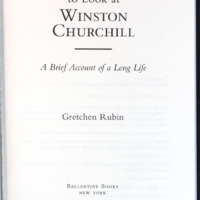-
Title
-
Forty ways to look at Winston Churchill : a brief account of a long life
-
Description
-
An accessible portrait of Winston Churchill captures the contradictions and complexities of the legendary British leader as it presents forty contrasting views of the man, his life, his accomplishments, and his contributions to history.
-
Subject
-
"Churchill, Winston, 1874-1965."
-
"Prime ministers--Great Britain--Biography."
-
Text
-
Transcription of Annotations
Front and back endpapers include notes regarding Churchill's family background, his career as a politician, his marriage and children, and conflicting statements about him as a person. It is noted that he switched twice between the conservative and liberal party, that he lacked a university education, that his campaign as Lord of the Admiralty to take the Dardanelles failed, but that he won in World War II, that he was out of power from 1929 until 1939, and again from 1945 until 1951. His most decisive moment is said to have occurred on May 28, 1940, when Churchill told the Cabinet after the defeat of Dunkirk, that "whatever happens, we shall fight on" (p. 38). He is characterized as a reckless, conceited opportunist, heavy drinking, rude, egotistical, and sentimental, a terrible listener, a gifted speaker and brilliant writer. He enjoyed painting. His "love of war" is called his defining characteristic; the author sees Churchill as a tragic hero since his victory was the Empire's undoing. -- Annotations by Brian Lamb in the margins and underlining of pertinent phrases throughout the book. -- Examples: p. 3: "I was struck to see his biographers reach different conclusions from the same facts. Was Churchill a military genius or a meddling amateur? Was he a great defender of liberty or a reactionary imperialist? Was he a success or a failure?" -- p. 50: "There I sat with the great Russian bear on one side of me, with paws outstretched, and, on the other side the great American buffalo, and between the two sat the poor little English donkey who was the only one of the three, who knew the right way home." -- p. 89: "Winston leads general conversation on the hearth rug addressing himself in the looking glass - a sympathetic and admiring audience." -- p. 210: "His traditional values: social tradition, soldierly glory, British superiority."
-
Creator
-
Rubin, Gretchen Craft
-
Source
-
Brian Lamb Booknotes Collection
-
Gift of Brian Lamb, 2011.
-
Catalog record
-
Publisher
-
Ballantine Books
-
George Mason University. Libraries. Special Collections & Archives
-
Date
-
2003
-
Program air date: August 10, 2003
-
Rights
-
This work may be protected by copyright laws and is provided for educational and research purposes only. Any infringing use may be subject to disciplinary action and/or civil or criminal liability as provided by law. If you believe that you are the rights-holder and object to Mason’s use of this image, please contact speccoll@gmu.edu.
-
Relation
-
Original Booknotes interview
-
Format
-
1st ed.
-
Language
-
eng
-
Identifier
-
1121974
-
345450477
 1121974.pdf
1121974.pdf